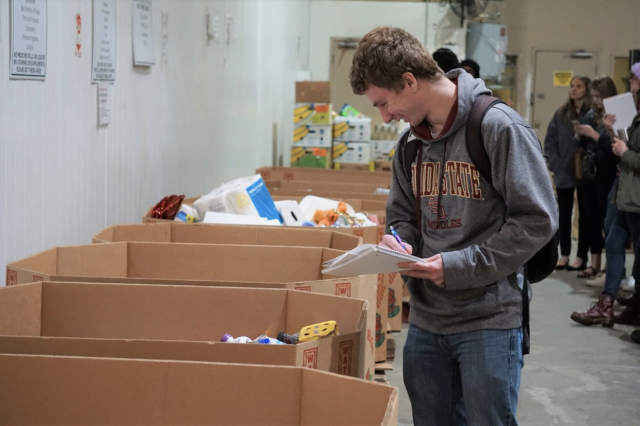Students Lay Foundations for Student Food Insecurity Survey

Students studying Food Systems Planning learned about student hunger at FSU and charted a course for future study.
Student hunger is at an all-time high, and students across the country are forced to make tough choices with their limited resources. Within the Tallahassee area, a recent study estimated that the food insecurity rate in the 32304 zip code is as high as 42%. However, no scientific study has yet been able to determine the food insecurity rates among the FSU student population.
Led by Dr. Will Butler, Associate Professor in the Department of Urban and Regional Planning, the Spring 2020 URP 5407 Food Systems Planning course connected students with Second Harvest of the Big Bend and the FSU Food for Thought Pantry to design a research study focused on student food insecurity on the University campus.
A team of graduate students collaborated on three different aspects of the project. One group conducted an in-depth literature review of previous food insecurity studies in a higher education context. Another group designed the survey instrument with a focus on general food insecurity, utilization of University resources, and local food environment accessibility.
The third group completed a round of beta testing and conducted qualitative research through interviews with University administrators. Throughout the semester, students also visited the FSU Food for Thought Pantry and the Second Harvest of the Big Bend warehouse, gaining a deeper understanding of both resources.
Due to the unforeseen circumstances of COVID-19 situation, the project faced many challenges and was not able to be fully implemented. However the students’ work still represents major progress towards understanding student hunger in the Tallahassee community.
“I am so impressed, especially given the obstacles the students have had to overcome,” said Shari Hubbard, Second Harvest of the Big Bend Director of Community Relations. “This has been something that we’ve been wanting to shine a spotlight on and collect more information about for such a long time, and just to feel that we’ve taken this giant step forward is so exciting.”
From a student perspective, the project was fun to participate in because it allowed students to put boots on the ground and see what was happening in their own community.
“In academia, we sometimes create proposals, and we’re not necessarily sure what we’re doing it for,” said one participating student. “We do it for the publication, but that only gets read or only helps a limited number of people sometimes. I liked approaching this project in a more real, community-oriented way.”
In the future, the students’ survey instrument will be utilized for further study. Butler is optimistic that the tool will shed new light on the student food insecurity challenge on campus. Further analysis could also integrate the context of COVID-19 and the changes the pandemic has made to student hunger.
To learn more about Second Harvest of the Big Bend, visit fightinghunger.org.
To learn more about the Campus as a Living Labs program, visit sustainablecampus.fsu.edu/academics-research/campus-living-laboratory.
